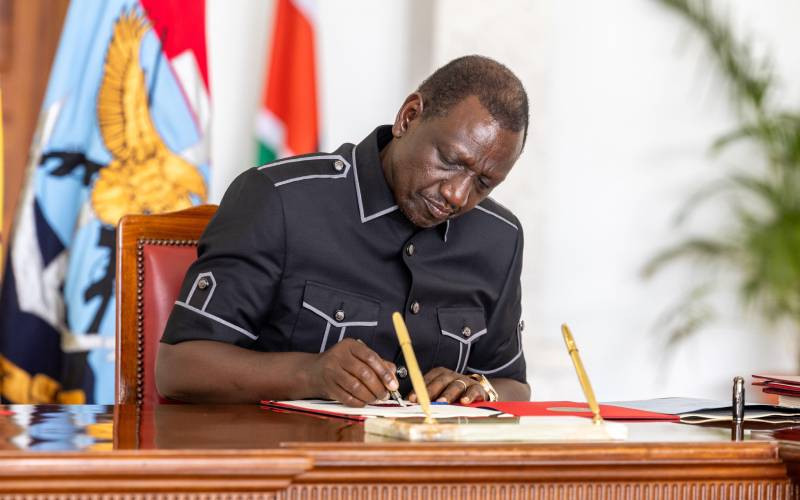Kenya: Donald Glaser won a Nobel Prize in physics in 1960 for, among other things, inventing the bubble chamber used to detect sub-atomic particles (you will recall these if you did not sleep during your physics lessons). It is claimed, though he refuted it, that he got the inspiration to design the chamber from beer.
Whether Glaser’s bubble chamber idea came from beer or not, it is an indicator that great ideas do not necessarily come from seminars, conferences or high-powered meetings. They can result from very informal situations, from parties to a walk in the park.
Slaves of formality
Yet, as we go through our academic journey from primary school to university to the world of work, informality is attenuated and eventually killed.
Ever wondered why a child learns a language in two years? This has something to do with informality. They learn naturally, compared with schools where there are formal rules and regulations. I’m not calling for anarchy, but we have taken formality too far.
One of the biggest differences between developed and developing countries is that the latter countries are slaves of formality. Everything must be done in certain ways, even when it does not make sense.
There is formality in our homes on how children should be treated, how marriage should be handled and so on. Add our traditions and cultures, and formality assumes a life of its own. In schools, we know how formal things can be, from calling some people ‘sir’ to wearing uniforms and sitting exams.
In workplaces, there are rules on how to dress and even talk. You must report to work at certain times and stay in the office even if you are doing nothing.
Churches are equally formal, particularly the mainstream ones, a loophole the new charismatic churches have taken advantage of to grow their numbers. They do not need to be formal, they can dance on one leg and anyone can preach or give a testimony.
In political circles, formality is taken to another level, with people employed to take care of protocol. Ever been to a political meeting and noted the format on who talks first, who invites whom, and so on?
A good example: we imported positions like senators and governors, but still someone uniformed stands behind the President. Ever seen anyone standing behind US President Obama?
Unwritten rules
Interestingly, formality is common outside formal (oops) institutions. Even among Generation Y, there are unwritten rules on relationships, careers, where they should live, whom to associate with, and so on. Talk to young people and it is as if they read from the same script, even when one is from Shamakhoho and the other from Shimba Hills.
Compare this with developing countries like US or Canada, where lots of informality is allowed. My professors bring sweets to class! An exam can be cancelled because someone’s pet died! Looks petty, but where has our seriousness taken us?
The first casualty of formality is creativity and innovation. Nobody wants to try something new because of the fear of disapproval. It is worse in employment because you can lose your job for coming up with new ideas.
Stay informed. Subscribe to our newsletter
Yet great ideas that have transformed human society did not originate from laboratories, conferences or meetings, but from informal encounters. Even the best husbands and wives are gotten informally — try taking leave to find a spouse.
Unintended consequence
Great political leaders like Mahatma Gandhi or corporate leaders like Bill Gates took the road less travelled. Google’s success can be explained by its tolerance of informality.
Why can’t we go from formal to informal? Is that not how corporations are born — a few people meet over a beer or cup of tea and spawn an idea that changes the world? Then with time, the jua kali idea is registered and formalised.
Formality has another unintended consequence: old tired ideas are perpetuated because no one want to challenge them.
Academia is not innocent on this. Bring a great idea and the first question is, where has it been published? No one has ever made money by reading a textbook. The best ideas are informal, copyrighted by their informality!
When we list the enemies of progress, we rarely list formality, from wearing black suits in tropical heat to wearing black graduation gowns in Mombasa or Thika. What would happen if the graduation gown were white or even yellow?
We still have VIP lifts despite talking about equality in the Constitution. Think of the amount of useful time eaten up by formality often clothed in terms like ‘consultation’, ‘put it in writing’ and other convoluted language. Is marginal revenue not the same as price?
On the roads, formality really kills the economy.
Someone fixed the maximum speed on highways at 80km before I was born, when cars had carburettors, manual gears and no ABS brakes. We went through EFI engines and are now on to VVTI, but the speed limit is even lower now! If there is an accident, blame the driver, not fake spare parts or bad roads.
Emancipate Kenya
Formality has made most provisions in our Constitution a joke. We talk of the Bill of Rights, but the police take them away because of formalities.
Formality is often a cover up for insecurity, incompetence and powerlessness. Why do governors want to be addressed as His Excellency when Obama is Mr President?
We waste lots of time on formal ceremonies, and hold lots of brains hostage through formalities.
Before we think of big things like globalisation, Constitution, and devolution, we must emancipate our country from the yoke of formality. I have no doubt that if we were just a little bit informal, there would be a spike in our economic growth rate and national happiness.
The writer is at the University of Toronto on an intellectual pilgrimage. [email protected]
 The Standard Group Plc is a
multi-media organization with investments in media platforms spanning newspaper
print operations, television, radio broadcasting, digital and online services. The
Standard Group is recognized as a leading multi-media house in Kenya with a key
influence in matters of national and international interest.
The Standard Group Plc is a
multi-media organization with investments in media platforms spanning newspaper
print operations, television, radio broadcasting, digital and online services. The
Standard Group is recognized as a leading multi-media house in Kenya with a key
influence in matters of national and international interest.
 The Standard Group Plc is a
multi-media organization with investments in media platforms spanning newspaper
print operations, television, radio broadcasting, digital and online services. The
Standard Group is recognized as a leading multi-media house in Kenya with a key
influence in matters of national and international interest.
The Standard Group Plc is a
multi-media organization with investments in media platforms spanning newspaper
print operations, television, radio broadcasting, digital and online services. The
Standard Group is recognized as a leading multi-media house in Kenya with a key
influence in matters of national and international interest.







